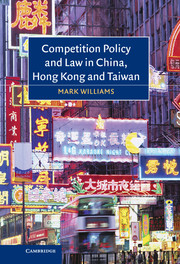Book contents
- Frontmatter
- Contents
- Preface
- Acknowledgements
- List of abbreviations
- 1 Introduction and methodology
- 2 Competition theory and the experience of states adopting competition law
- 3 The international perspective
- 4 China and economic regulation – history, politics and economics
- 5 Existing and proposed Chinese competition provisions
- 6 Competitive Hong Kong? myths, perception and reality
- 7 Implementation of competition policy in Hong Kong 1997–2004: economising with the truth
- 8 Electricity, telecommunication and broadcasting: competition regulation Hong Kong style
- 9 Taiwan - the third China
- 10 Political economy: an explanation of competition policy in Greater China
- 11 Competition policy and law in Greater China: where next?
- Bibliography
- Index
Preface
Published online by Cambridge University Press: 28 July 2009
- Frontmatter
- Contents
- Preface
- Acknowledgements
- List of abbreviations
- 1 Introduction and methodology
- 2 Competition theory and the experience of states adopting competition law
- 3 The international perspective
- 4 China and economic regulation – history, politics and economics
- 5 Existing and proposed Chinese competition provisions
- 6 Competitive Hong Kong? myths, perception and reality
- 7 Implementation of competition policy in Hong Kong 1997–2004: economising with the truth
- 8 Electricity, telecommunication and broadcasting: competition regulation Hong Kong style
- 9 Taiwan - the third China
- 10 Political economy: an explanation of competition policy in Greater China
- 11 Competition policy and law in Greater China: where next?
- Bibliography
- Index
Summary
The primary purpose of this book is to describe and analyse the competition law systems in place in Greater China. In order to do that, I decided that it was necessary, and appropriate, to place the extant systems in the context of the relevant economic theory that underpins competition regulation globally. The experience of developing and transitional states which have sought to adopt competition policy and law was also very illuminating in exposing common problems in the adoption process and so selected national cases have also been examined. The wider context of international developments in the competition law field have also played a part in the development of this branch of the law in Greater China and so they, too, are considered.
In order to accomplish my principal task, I also considered that, before undertaking a lawyer's analysis of the legal norms found in China, Hong Kong and Taiwan, it was essential to appreciate the historical, political and economic conditions of all three jurisdictions, for without that background knowledge the present state of competition regulation would be opaque and incapable of satisfactory explanation.
I have also attempted to create an explanatory theory from the facts I have found by use of a sociological methodology known as grounded theory, which allows for the construction of a theoretical explanation of the sometimes puzzling circumstances that pertain in competition policy and law in Greater China. The resultant hypothesis suggests that without a functioning democracy, which is explained in detail in the text, successful and effective adoption of a competition regime is impossible.
- Type
- Chapter
- Information
- Competition Policy and Law in China, Hong Kong and Taiwan , pp. xi - xiiiPublisher: Cambridge University PressPrint publication year: 2005

